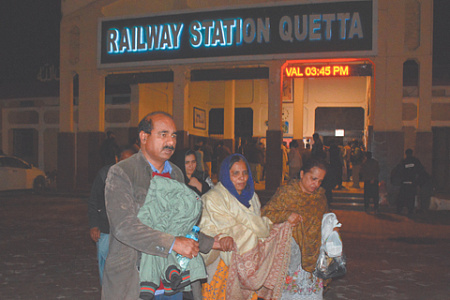
The attack by militants of the Balochistan Liberation Army group on a passenger train traveling from the city of Quetta to Peshawar showed that the Pakistani security forces are not yet able to cope with the terrorists. Their propaganda, claiming that the government is exploiting the underground wealth of Balochistan province, depriving indigenous people of earnings, resonates with some of the youth. The tragedy on the railway may increase the anxiety of foreign investors investing in the country’s economy. It is even possible that China will temporarily suspend sending specialists to construction sites in Pakistan.
As a result of the militant attack on the train on March 11, at least 50 people were killed. Among them are the train driver and soldiers from the security service, who always guard passenger trains in this part of the country. As of Wednesday morning, 155 hostages out of about 450 people on the train had been rescued. The difficulty for the army unit and the police officers who tried to smoke out the militants is that they have explosives attached to their bodies. Government spokesman Shahid Ring said that the military involved in the liberation operation were being supported from the air by helicopters. But they have to act cautiously. In the morning, 27 militants were killed. It was only in the evening that the authorities announced the release of the hostages. 28 soldiers died during the operation.
This was the first time such an attack on a train had occurred. But clashes in Balochistan province have been taking place for a long time and regularly. The militants are attacking police officers, soldiers and army officers, as well as civilians, in particular Chinese citizens working at construction sites and enterprises of the economic corridor, which is supposed to connect Northwestern China, which has no access to the sea, with the Indian Ocean. China has invested tens of billions of dollars in this project, which has become part of the Belt and Road program, which covers almost the entire world.
Balochistan is the largest and most sparsely populated province of Pakistan. In addition to the minerals that the land of this province is rich in, there are also oil deposits. Baloch representatives claim that they are being exploited and discriminated against by Islamabad, that is, the central government. The militants have attacked trains before, but they have never been able to capture the train. Last November, the separatists sent a suicide bomber to a train station in Quetta. Then 26 people died. Authorities and analysts in Pakistan believe that the Balochistan Liberation Army has about 3,000 fighters.
Her representative warned that the hostages would suffer if the government did not negotiate. He offered the country’s authorities a deal: the separatists would release the passengers if the government released their fighters from prison. There was no response from the authorities.
In an interview with NG, Vladimir Sotnikov, a leading researcher at the Institute of China and Modern Asia of the Russian Academy of Sciences, noted: “The train tragedy may negatively affect the construction of the economic corridor. There have already been two incidents where Chinese engineers, workers, and local staff have died. The Chinese have long been sounding the alarm about the lack of security at enterprises and construction sites in a friendly country. They cannot abandon the economic corridor. It has invested too much money, and it promises too much return for China. And most of the projects have already been completed. But Beijing can suspend sending specialists. The Chinese wanted to finish the construction work this year. In this case, the commissioning of the economic corridor will be postponed for a year.”
As for the internal situation, the Balochistan Liberation Army is engaged in an uncompromising struggle with the central authorities for the independence of the province. “By the way, Balochis living in Iran help her in this. There is also the Jundallah group, which is also based in Iran and organizes terrorist attacks. Both Pakistan and Iran call it terrorist and are actively fighting it. The Pakistani government says it will never negotiate with terrorists. And, of course, it will not allow Balochistan to secede from the country. The problem is that the Pakistani army, which has about 10-15 thousand bayonets at its bases in the province, does not control it yet. And the militants operate in compact groups, which are replenished at the expense of young people,” the expert explained.
Answering the question of what role the external factor plays in rocking the situation, Sotnikov said: “The militants obviously own mines, sell minerals and use this to buy weapons. The main sponsor is the Taliban (the group is recognized as a terrorist group and banned in Russia. – “NG”). Moreover, these are not the Afghan Taliban, but the Taliban–Pakistan movement, which is recognized as terrorist and banned in Russia. – “NG”). It is currently located on the territory of Afghanistan. The Pakistani army forced this group out of Pakistan.”
